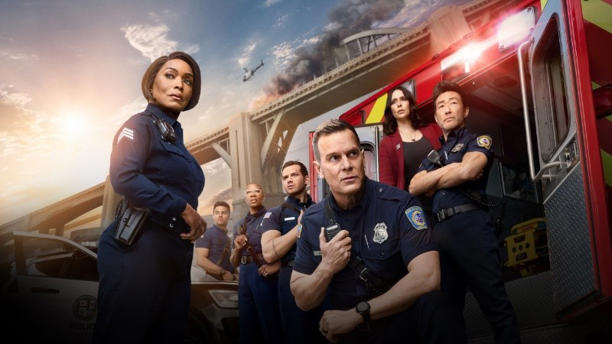
9-1-1 Season 8: Production Changes Due to Los Angeles Wildfires
Introduction: When Reality Mirrors Fiction
Have you ever wondered what happens when a TV show about first responders faces real-life emergencies? That’s exactly what happened during the filming of 9-1-1 Season 8 when the Los Angeles wildfires forced significant changes to the production. Let’s take a closer look at how the team adapted to the challenges, proving their resilience both on and off-screen.
The Reality of Los Angeles Wildfires
What Makes LA Wildfires So Devastating?
Los Angeles is no stranger to wildfires, with dry conditions, high winds, and soaring temperatures creating a perfect storm. These fires don’t just threaten homes and lives—they disrupt entire industries, including Hollywood.
A Year of Unprecedented Challenges
During the filming of 9-1-1 Season 8, the wildfires reached new levels of intensity. Production crews faced safety concerns, poor air quality, and logistical nightmares.
How the Wildfires Disrupted Production
Evacuations and Location Changes
Some planned filming locations were directly in the path of the fires, forcing the team to evacuate and relocate to safer areas. This caused delays and added unexpected costs to the production.
Air Quality Issues
Even when fires weren’t nearby, the smoke and poor air quality made outdoor filming nearly impossible. The cast and crew had to prioritize their health, often rescheduling or moving scenes indoors.
Adapting to Unforeseen Challenges
Creative Problem-Solving on Set
The production team had to think on their feet. Some scenes were rewritten to fit indoor settings, while others were postponed until conditions improved.
Incorporating Real Events Into the Storyline
Interestingly, the wildfires inspired parts of the Season 8 storyline. Writers wove real-world challenges into the script, blurring the lines between fiction and reality.
The Impact on the Cast and Crew
Health and Safety First
Working amidst wildfire conditions isn’t just inconvenient—it’s dangerous. The cast and crew were provided with protective gear and frequent health check-ins to ensure their safety.
Emotional Toll of the Wildfires
For a show centered around emergencies, facing a real one was emotionally taxing. Many crew members had personal connections to the areas affected by the fires, adding a layer of stress to their work.
Technological Innovations to the Rescue
Using CGI to Fill in the Gaps
When outdoor filming wasn’t possible, the team leaned heavily on CGI to create realistic backdrops. This allowed them to maintain the show’s high production standards without compromising safety.
Remote Collaboration Tools
The wildfires pushed the team to explore remote collaboration, using virtual tools for planning and communication. This innovation streamlined workflows and kept production on track.
Storylines Reflecting Real Life
A Nod to Real-Life Heroes
Season 8 pays tribute to firefighters and first responders who battled the wildfires, adding authenticity and emotional depth to the show.
How the Wildfires Shaped the Narrative
Some of the most gripping scenes in Season 8 were inspired by the real challenges the production team faced, creating a more relatable and impactful storyline.
Fans’ Reactions to the Wildfire-Inspired Changes
Positive Feedback on Authenticity
Fans praised the show for its ability to adapt to real-life events, making the storylines feel more grounded and timely.
Social Media Buzz
Viewers took to social media to discuss how the show’s depiction of wildfires mirrored their own experiences, fostering a deeper connection to the series.
Lessons Learned From the Wildfires
Resilience in the Face of Adversity
The 9-1-1 production team showed incredible resilience, proving that challenges can lead to creativity and innovation.
The Importance of Flexibility
The wildfires taught the crew the value of adaptability, a lesson that resonates far beyond the set.
Behind-the-Scenes Insights
Interviews With the Cast and Crew
In interviews, cast members shared how the wildfires brought them closer as a team, reinforcing the show’s themes of camaraderie and resilience.
What Didn’t Make the Final Cut
Some scenes had to be scrapped entirely due to the wildfires, leaving fans curious about what could have been.
Looking Ahead: What’s Next for 9-1-1?
Preparing for Future Challenges
The wildfires have set a new standard for how the production team handles unforeseen obstacles, ensuring they’re better prepared for future seasons.
How This Experience Will Shape Season 9
The lessons learned during Season 8 are likely to influence the approach to Season 9, both in terms of production and storytelling.
Conclusion: Turning Adversity Into Opportunity
The Los Angeles wildfires posed significant challenges for 9-1-1 Season 8, but the production team turned adversity into an opportunity for creativity and growth. By adapting to real-world events, they not only kept the show on track but also delivered a season that felt more authentic and emotionally resonant than ever.
FAQs
1. How did the Los Angeles wildfires affect the filming of 9-1-1 Season 8?
The wildfires caused location changes, air quality issues, and delays, forcing the team to adapt with creative solutions like CGI and rewritten scenes.
2. Did the wildfires inspire any storylines in Season 8?
Yes, the writers incorporated elements of the wildfires into the narrative, adding authenticity and emotional depth to the season.
3. How did the production team ensure the safety of the cast and crew?
Protective gear, health check-ins, and relocating to safer areas were some of the measures taken to prioritize safety during filming.
4. Were there any major delays in production due to the wildfires?
While there were some delays, the team’s adaptability and use of technology helped minimize the impact on the production schedule.
5. What lessons did the production team learn from this experience?
The wildfires taught the team the importance of resilience, flexibility, and innovation, lessons that will shape future seasons.
